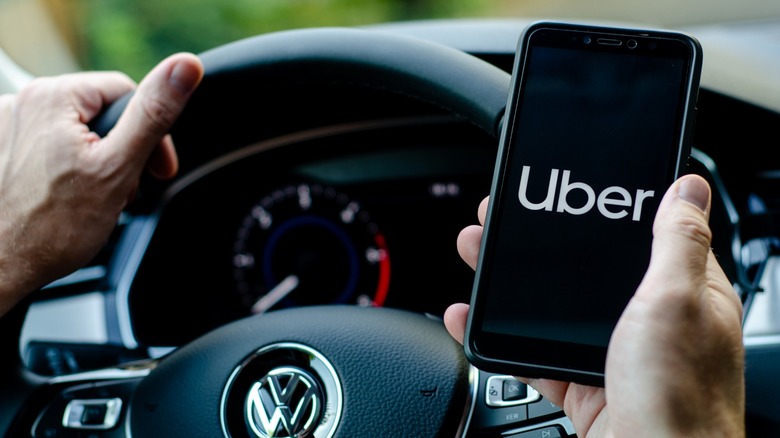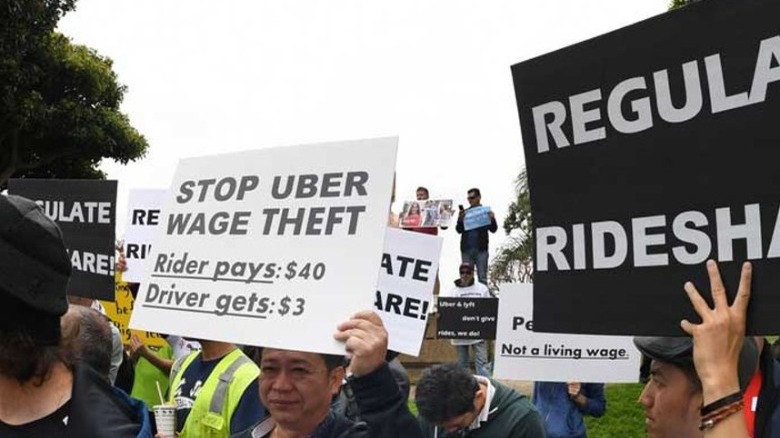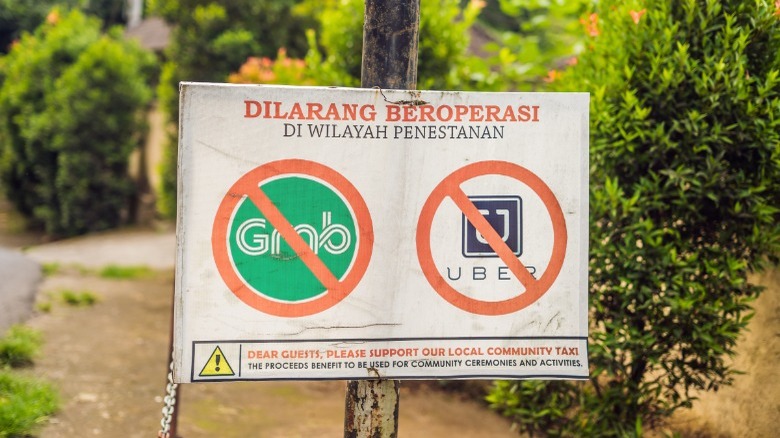This Is Why So Many People Hate Uber
Getting around has never been easier than it is today, with a variety of options available for potential riders being just a few taps away. Uber is one of the oldest and biggest ride hailing apps, with over 131 million monthly users. The ride-hailing industry itself has faced a number of issues, with questions largely surrounding workers' ethics, business laws in various countries, and the negative large-scale impact it has on public transportation and traffic.
Given the company's commanding presence in the ride-hailing app market, it inevitably has no shortage of detractors that have issues with how it conducts business. Everything from employee treatment, cost, and data collection, to its handling of sexual assault issues, have earned Uber ire from both the public and regulators.
One big overarching problem Uber seems to have is accountability, with one particularly harrowing story on Twitter re-telling how an Uber driver basically temporarily kidnapped a rider and tried to take her out on a date against her will.
Uber's preference for profit over people
Throughout its operation, Uber has faced massive backlash over its treatment and underpayment of both Uber and Uber Eats drivers. With many Uber drivers just barely not living in poverty, it's not surprising that organizations like Rideshare Drivers United have started fighting for the recognition of both Uber and Lyft drivers as actual employees instead of gig workers. This would grant drivers a number of benefits, including a minimum wage, health benefits, and worker protections.
Business moves extraordinarily fast in Silicon Valley, especially when compared to the molasses that is government legislation, and Uber is evidence of this. In the U.S., California had been leading the charge with the California Assembly Bill 5, which would have forced companies like Uber and Lyft to recognize their drivers as employees, according to non-profit CalMatters.
The subsequent fight between the state and the ridesharing companies ultimately dashed the hopes of drivers seeking stable income. Prop 22, which passed in California, established far looser regulations on ridesharing companies, allowing them to continue classifying drivers as independent contractors, which mandates certain benefits depending on hours worked.
Uber is banned in some countries thanks to workers' rights
Many countries, including those in the developed world, have already forced Uber to recognize app-based gig workers as employees. While Uber claims that the gig work structure gives its riders freedom, many workers refute this, claiming it only results in overwork and underpay.
It's almost a meme at this point that Europe tends to handle regulations around both labor and technology better than the U.S., and the situation surrounding ride hailing proves this. There are a few instances of Uber being regulated into compliance, voluntarily ceasing operations in a country as a result, or having to concede and classify its workers as employees.
In the Netherlands, Uber lost a long-fought battle against the government over the issue, with the court eventually ruling that the employment agreement between Uber and the drivers essentially qualified them as employees rather than contractors. Licensing issues and push-back from other transport associations mean that Uber is banned or at least heavily restricted in countries like Denmark, France, Germany, Hungary, Switzerland, and Turkey.
Uber's insistence on skirting local regulations has turned it into a thorn in the side of many governments, while drivers and the public take to social media to decry the lack of job security and low pay offered to Uber's drivers — despite the sometimes predatory pricing.
Sexual assault allegations have resulted in legal action
Apart from the obviously contentious issues around workers rights and working agreements, Uber is also facing backlash due to sexual assault allegations. According to Uber's own Second U.S. Safety Report, the company received 3,824 reports of what it calls severe sexual assault and misconduct in between 2019 and 2020. This did represent a decrease of 38%, but it was also during a time when people were taking fewer trips and taking trips mostly for necessities already.
One particularly concerning issue regarding Uber's handling of sexual assault reports is that the company does not inform local law enforcement of any incidents, according to a report by The New York Times. It's gotten to the point where Uber is facing a lawsuit in San Francisco from 550 passengers who claim the company fails to adequately protect its patrons. Advocate groups explain that Uber is to be held responsible for acts perpetrated by its drivers because of negligent hiring practices.
It's clear that when a public-facing service like ridesharing explodes in popularity, as has been the case with Uber, there are bound to be issues. Uber's continued failure to adequately address issues and change the way it handles customer and employee complaints paint it in a bad light and hurt its reputation in an industry that implicitly demands trust.



